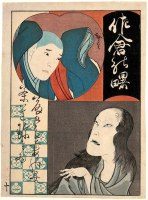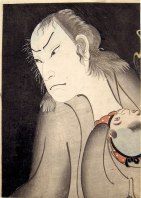Art of Japan, Folklore and Ghost of Koheiji: Konishi Hirosada and Richness of Faith
Lee Jay Walker
Modern Tokyo Times
The power of the Shinto faith runs deep throughout the fabric of Japanese religion, folklore, culture and other important aspects of society. Buddhism which emanated from outside of Japan would also greatly impact itself within the fabric of society. Modern Japan in major cities may look a million miles away from the richness of Japanese folklore but remnants remain. In the countryside the old world survives much more easily but throughout the veins of Japanese tradition major festivals keep aspects of old Japan alive within major cities even if diluted.
Of course, you will have many living religious places of worship throughout major cities in Japan but the mystery can be felt stronger in the “still night” of the countryside whereby local shrines have so much power. Not surprisingly, with the two dominant faiths having so much richness then ghosts, demons and the underworld played a powerful role in Japanese folklore.
This in turn expressed itself through Japanese art, plays and literature. In the world of ukiyo-e many amazing artists depicted ghosts, demons and the underworld. Also, the power of Japanese culture and the indigenous Shinto faith impacted greatly on Buddhism. This means that many fusions have crossed over between the faiths of Shinto and Buddhism. Indeed, the mystery of the Shinto faith is its openness, diversity, blending naturally within nature and the richness of local traditions which vary from place to place.
Konishi Hirosada (Gosotei Hirosada) produces a stunning image of the ghost of Koheiji (top image in the article) which seeks revenge towards his wife Otowa and her devious lover. Koheiji is brutally tortured and murdered by Otowa with the hands of her lover to blame within many realms. This applies to psychology and a very twisted crime of passion induced by strong emotions between both scheming individuals. The pain of the torture and betrayal was brutally shocking and clearly Koheiji couldn’t enter the next world because his spirit was restless for revenge.
The Toshidama Gallery comments about the print by Konishi Hirosada that “This is a very fine and rare print by the Osaka artists Konishi Hirosada. It depicts the ghost of Kohata Koheiji who, having been tortured and drowned by his unfaithful wife Otowa and her scheming lover, takes revenge upon them from beyond the grave. Koheiji is played by the kabuki actor Arashi Rikaku II. Revenge plays of this sort were hugely popular and often depicted evil women called akuba. This play, A Mysterious Tale of Revenge at Asaka Marsh, was so popular with audiences that a sequel was commissioned.”
Toshidama Gallery further comments that “A strange twist, given the subject of this role, is that the actor portrayed here, Arashi Rikaku II, was the adoptive father of Arashi Rikaku III, himself imprisoned for his part in the poisoning (of) his lover’s mistress. His lover, Yoarashi Okinu, was what audiences would refer to as an akuba. She administered the poison after becoming pregnant by Rikaku. She was eventually arrested in May 1871 and decapitated in 1872.”
Clearly Koheiji was unlucky to have married an akuba lady because these ladies would do anything for the people they love. Extortion and murder, and other acts of betrayal, were part and parcel of being an akubalady. However, the spirit of Koheiji was too strong because he desired vengeance from the underworld and refused to enter either heaven or hell until he fulfilled this.
The power of ghost stories in the Edo and Meiji periods of Japanese history were cherished because of the strong connection of faith and the power of the stories that were portrayed. At the same time amazing ukiyo-e artists could depict the vastness of this world.
http://www.toshidama-japanese-prints.com/item_261/Hirosada-The-Ghost-of-Togoros-Wife.htm
http://www.toshidama-japanese-prints.com/
http://toshidama.wordpress.com/
Modern Tokyo News is part of the Modern Tokyo Times group
http://moderntokyotimes.com Modern Tokyo Times – International News and Japan News
http://sawandjay.com Modern Tokyo Times – Fashion
http://moderntokyonews.com Modern Tokyo News – Tokyo News and International News
http://global-security-news.com Global Security News – Geopolitics and Terrorism
PLEASE JOIN ON TWITTER
https://twitter.com/MTT_News Modern Tokyo Times
PLEASE JOIN ON FACEBOOK
https://www.facebook.com/moderntokyotimes
Some articles about Japanese art and culture by Modern Tokyo Times are republished based on the need to highlight the unique reality of Japan to our international readership.


